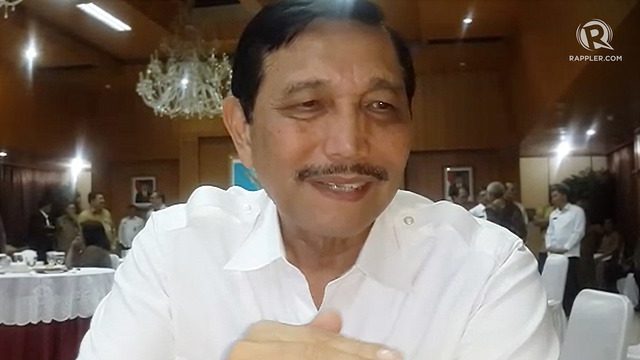SUMMARY
This is AI generated summarization, which may have errors. For context, always refer to the full article.

A long-simmering internal battle over natural resource policy under Indonesian President Joko Widodo is now being fought out in public with two cabinet ministers at bitter odds over charges that the Speaker of the House of Representatives – possibly with the backing of other elements in the government – attempted to extort shares from US mining giant Freeport McMoRan in exchange for help obtaining a long-sought contract extension for the company’s massive Grasberg gold and copper mine in Papua.
The outcome can be expected to have a major impact on public policy in Indonesia. It also presents dangers for Jokowi, as the president is known, who more than a year into his presidency has begun to show the kind of reform steel that voters expected of him when he was elected.
However, he is also confronting powerful forces created by decades of corruption, secrecy and kleptocracy.
The scandal is pitting reform-minded Energy and Mines Minister Sudirman Said, who brought ethics charges last week against House Speaker Setya Novanto for allegedly seeking the bribe, against Coordinating Security Minister Luhut Panjaitan, a savvy ex-general who is one of the president’s top aides.
Setya is a member of the opposition Golkar Party.
Speak into the mike
Luhut used his previous perch as the president’s chief of staff to attempt to block a Freeport extension, supposedly to obtain a better deal for the country. It has long been rumored that Luhut also wanted the sacking of Sudirman, an anti-corruption activist put into a notoriously corrupt ministry to drive change.
On Monday, November 16, charges were filed by Sudirman after a recording transcript surfaced of the politician demanding shares in the company in exchange for political help with the contract extension. On Wednesday, Luhut questioned Sudirman’s claim that the president was informed that charges would be brought. (READ: Luhut: The general who has Jokowi’s back)
“The president told me that he had never instructed Sudirman to file the report [against Setya],” Luhut told reporters. “I feel it is very strange.”
While Luhut’s name is mentioned on the tape several times, there is no evidence of any wrongdoing on his part. Setya said in the meeting that he was seeking to obtain 20% of the company’s shares for the president and Vice President Jusuf Kalla.
He has since denied invoking the president’s name and said the whole conversation was a joke. Late Friday, the confusion increased when a Golkar Party leader announced that Setya had resigned his post and then an hour later retracted the “resignation,” saying the party supported the embattled speaker.
With his move against the alleged bribe attempt, Sudirman has arguably become the face of government reform.
Inside the ministry, he is known for appointing reformist officials and attempting to end murky practices in the lucrative natural resources sector. Popular with investors, he is now a political star heralded by Indonesians sick of corruption in high places.
The recording was made in June by Freeport CEO Maroef Sjamsoeddin, himself a consummate insider, a retired general and former No. 2 at the national intelligence agency.
Also in the meeting at which the bribe was allegedly discussed was Mohammad Riza, an oil trading kingpin and one of Indonesia’s most powerful and secretive businessmen. Freeport has made no comment on the matter. Luhut denies having any business relationship with Riza.
The dark side
In blowing the whistle, Sudirman has given the public a rare glimpse into the way business has long been done in the country. Powerful interests are frequently rumored to pass billions of dollars among themselves in exchange for favors, deals and influence. Rarely do any facts emerge.
The high-risk move to name and shame Setya, which is widely believed to have been done with the president’s blessing, may be a sign of more fundamental change under Jokowi but he has yet to tip his hand openly.
The 3 men present in the room – a shady politician, a businessman skilled at operating in secret and a former general – would all have known each other well and to have known the longstanding rules.
The wild card is that Freeport’s Maroef now works for a unit of a publicly-traded US company that would risk prosecution under the US Foreign Corrupt Practices Act if it were to hand out billions of dollars in shares to crooked politicians. By making the recording and apparently arranging for its release to the government, Maroef betrayed the Mafia-like silence that governs the Indonesian elite.
The plot is stickier still given that both Maroef and Sudirman are said to be quite close to Vice President Kalla. Luhut and Kalla are seen as bitter rivals for power and influence in the administration.
Whatever his motivations for criticizing Sudirman and earlier seeking to block a Freeport deal, Luhut risks marginalizing himself if he appears to be standing against the reforms the president is seeking.
The timeline for the affair seems to speak volumes. The secret meeting took place in June and seems to have come to the president’s attention not long after. He was said to be furious. – Rappler.com
Read the rest of this story on Asia Sentinel.
Add a comment
How does this make you feel?
There are no comments yet. Add your comment to start the conversation.